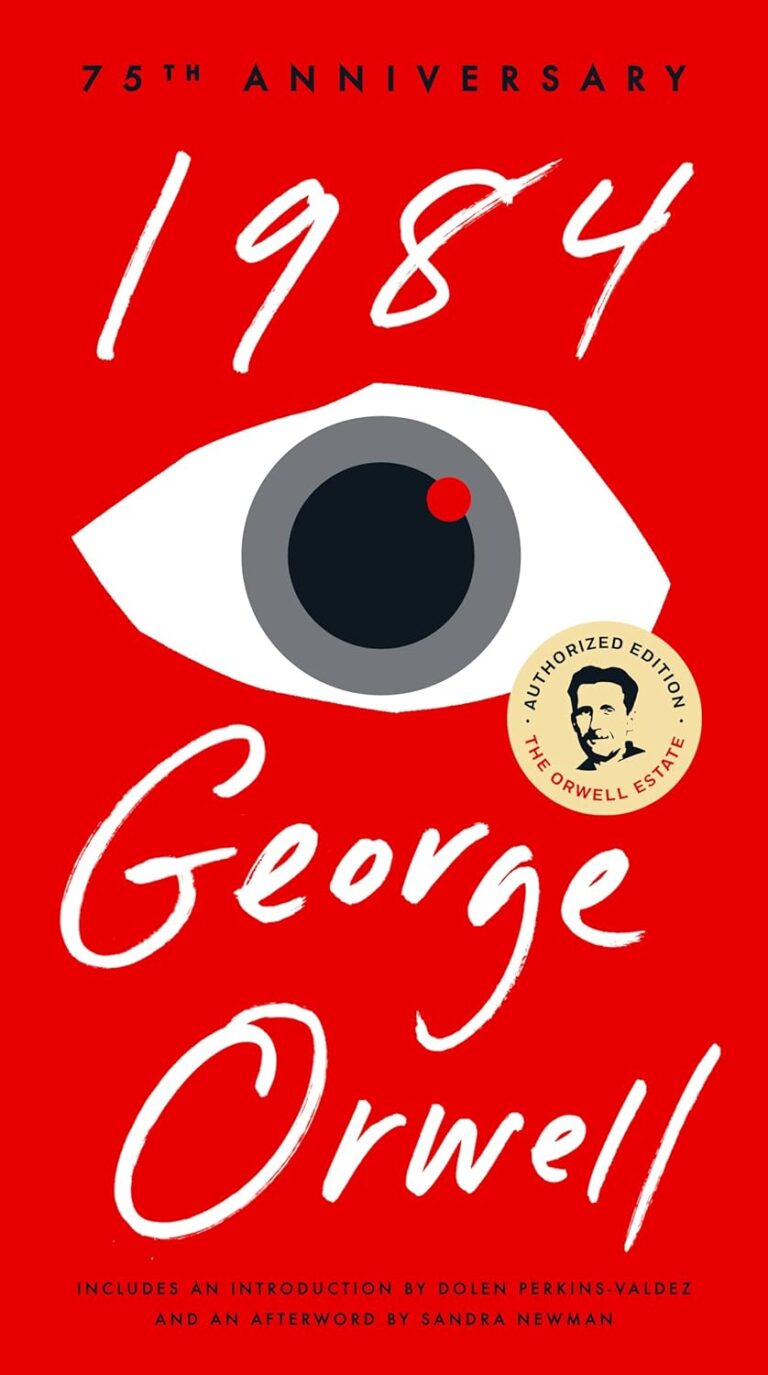This year, I had the pleasure of reading a true classic of English literature, 1984 by George Orwell. In this book, the author imagined a world where totalitarianism shaped not only governments but thoughts, memories, and even language itself. When it was published in 1949, the novel was seen as a dark warning that many hoped would never become reality. But more than seventy years later, Orwell’s dystopia feels eerily familiar and his quotes feel more relevant than ever.
Here are 9 ways Orwell was uncannily right about the state of our world.
Manipulation of Information
In 1984, the “Ministry of Truth” is responsible for constantly rewriting history to fit the narrative of the ruling political party. Today, we see state and corporate actors manipulating facts in real time. Governments deploy strategies to erase failures, social media algorithms boost misinformation, and AI-generated content muddies the waters even further. In many countries, official records are doctored, and inconvenient truths are scrubbed from the internet. The idea that “who controls the past controls the future” is no longer just fiction, it’s strategy.
And if all others accepted the lie which the Party imposed, if all records told the same tale, then the lie passed into history and became truth. "Who controls the past," ran the Party slogan, "controls the future: who controls the present controls the past."
Twisted Perceptions of "Truth"
George Orwell explains in 1984 that “doublethink” allows people to believe two contradictory ideas at once. We’re now living in a post-truth era, where alternative facts coexist with verified evidence, and critical thinking is routinely sidelined. Truth has become subjective, and that’s dangerous. From climate denialism to anti-vaccine rhetoric to deepfakes, our perception of what’s real is being twisted at scale.
The Party told you to reject the evidence of your eyes and ears. It was their final, most essential command.
Authoritarian Domination
Orwell’s world was ruled by Big Brother, a symbol of all-seeing control. Fast-forward to today: surveillance tech tracks us across cities and phones, biometric data is harvested without consent, and dissent is criminalised in many regimes. Authoritarianism isn’t only surviving, it’s thriving. Populist leaders consolidate power, suppress opposition, and turn democratic institutions into tools of control. From press restrictions in Russia to digital repression in China, Orwell’s authoritarian nightmare is no longer confined to fiction.
Power is not a means; it is an end. One does not establish a dictatorship in order to safeguard a revolution; one makes the revolution in order to establish the dictatorship. The object of persecution is persecution. The object of torture is torture. The object of power is power.
Glorification of Violence
Violence is normalised in 1984, celebrated during the “Two Minutes Hate.” Today, our world is saturated with militaristic pride, glorified warfare, and toxic online outrage that treats dehumanisation as entertainment. Media sensationalises brutality. Pop culture romanticises vengeance. And in many countries, militarisation is tied to national identity. War games, drone strikes, or vigilante justice… Orwell’s vision of desensitised violence echoes loudly today.
The horrible thing about the Two Minutes Hate was not that one was obliged to act a part, but, on the contrary, that it was impossible to avoid joining in. Within thirty seconds any pretence was always unnecessary. A hideous ecstasy of fear and vindictiveness, a desire to kill, to torture, to smash faces in with a sledge-hammer, seemed to flow through the whole group of people like an electric current, turning one even against one’s will into a grimacing, screaming lunatic.

1984 by George Orwell
Winston Smith toes the Party line, rewriting history to satisfy the demands of the Ministry of Truth. With each lie he writes, Winston grows to hate the Party that seeks power for its own sake and persecutes those who dare to commit thoughtcrimes. But as he starts to think for himself, Winston can’t escape the fact that Big Brother is always watching…
A startling and haunting novel, 1984 creates an imaginary world that is completely convincing from start to finish. No one can deny the novel’s hold on the imaginations of whole generations, or the power of its admonitions—a power that seems to grow, not lessen, with the passage of time.
Censorship
Books were banned in 1984. Language was limited. Speech was criminal. Orwell coined “Newspeak” to show how language itself could be used to restrict thought. While we may not speak another language, censorship remains a powerful tool today and free speech is under threat. Journalists are silenced every day, online platforms restrict sensitive topics, and entire websites are blocked by governments. Even democratic societies see rising calls to censor opposing views, sometimes under the banner of protecting public order.
Every record has been destroyed or falsified, every book rewritten, every picture has been repainted, every statue and street building has been renamed, every date has been altered.
Multipolar World Order
In 1984, three superstates (Oceania, Eastasia, and Eurasia) are in constant conflict and alliance, with citizens kept in a state of perpetual war. We now live in a fragmented, multipolar world, with major powers vying for influence across global theatres. Alliances shift, proxy wars simmer, and trade wars escalate. The average person often has no idea who is fighting whom or why. This state of perpetual crisis or “permacrisis” distracts from domestic failures, just as Orwell imagined, and global instability becomes the norm, not the exception.
Everywhere there is the same pyramidal structure, the same worship of semi-divine leader, the same economy existing by and for continuous warfare. It follows that the three super-states not only cannot conquer one another, but would gain no advantage by doing so. On the contrary, so long as they remain in conflict they prop one another up, like three sheaves of corn.
Misogyny and Decreased Rights for Women
While 1984 doesn’t directly address gender, it portrays a world where women’s autonomy is stripped. The regime suppresses emotion, choice, and reproduction, as women are praised for their chastity. Today, we witness regression in women’s rights globally. From rollbacks in reproductive freedoms to rising femicide rates and underrepresentation in power structures, progress is stalling and in some cases, reversing. Orwell didn’t spell out patriarchy’s mechanisms, but he saw clearly how authoritarian control would target women’s bodies and choices.
He hated her because she was young and pretty and sexless, because he wanted to go to bed with her and would never do so, because round her sweet supple waist, which seemed to ask you to encircle it with your arm, there was only the odious scarlet sash, aggressive symbol of chastity.
Corrupted Global Arms Trade
In 1984, war isn’t meant to be won, it’s meant to fuel the economy and keep the population obedient. This sounds eerily close to the modern global arms industry, as detailed in The Shadow World. Defense budgets climb while public services shrink. Countries sell weapons to both allies and adversaries. Conflicts are prolonged for profit. As Orwell foresaw, endless war benefits those in power. And the weapons industry ensures that peace remains out of reach.
War, it will be seen, accomplishes the necessary destruction, but accomplishes it in a psychological acceptable way. In principle it would be quite simple to waste the surplus labour of the world by building temples and pyramids, by digging holes and filling them up again, or even by producing vast quantities of goods and then setting fire to them. But this would provide only the economic and not the emotional basis for a hierarchical society.
Invisible Injustice
Perhaps the most chilling part of 1984 is the normalisation of suffering. People disappear, are tortured, or live in crushing poverty, but the system hides these truths or reframes them as necessary. Today, injustice is everywhere and yet so often invisible. Exploited workers in supply chains. Stateless refugees. Mass incarceration. Structural racism. Orwell predicted a world where injustice wouldn’t need to be denied, just ignored. And in many ways, we’ve arrived.
The old civilizations claimed that they were founded on love or justice. Ours is founded upon hatred. In our world there will be no emotions except fear, rage, triumph, and self-abasement. Everything else we shall destroy – everything.
Final Thoughts
George Orwell didn’t write 1984 as a prophecy. He wrote it as a warning. Yet, so many of his dystopian visions, illustrates in these quotes, are now features of our global reality. While reading the book, I could not help but make incessant parallels with our contemporary politics. From manipulated truths to normalised surveillance, from militarism to inequality, Orwell’s insights are more relevant than ever. The question now is: will we recognise the patterns, or sleepwalk into deeper control? History may not be doomed to repeat itself. But if we fail to listen to Orwell’s warning, we may repeat something worse.
Subscribe
Receive my latest articles, what I’m currently reading and listening to, and my favourite resources directly in your mailbox, once a month.



